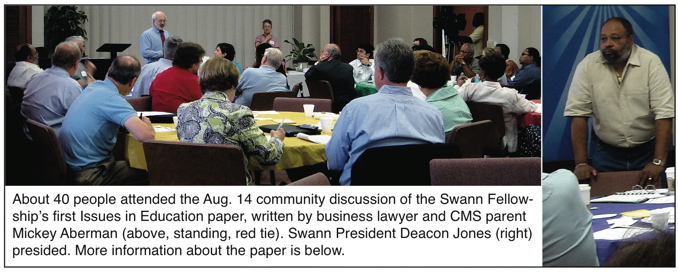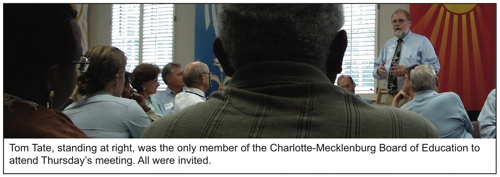Aug. 14, 2008
Fellowship holds community discussion of “Education and Poverty in Charlotte-Mecklenburg Schools.”
Discussion of paper on poverty draws unusual participants – outspoken teachers
Tuesday’s community discussion put on the table a lot of issues facing Charlotte-Mecklenburg.
And participants and the news coverage the meeting garnered may spark broader community discussion of those issues.
Swann Fellowship President Deacon Jones told the 40 educator,s parents and residents that the Fellowship’s board did not have all the answers, and didn’t even know that it knew all the questions.
 “We want to hear from you. We hope the answers and the questions are somewhere out here.”
“We want to hear from you. We hope the answers and the questions are somewhere out here.”
One answer he got came from the floor this way:
“Every child in this system is a child of mine… because if they fail, we fail.”
The meeting was called to discuss a “Education and Poverty in Charlotte-Mecklenburg Schools,” a paper written by J. Mitchell Aberman, a Charlotte business lawyer, parent of CMS students and a Swann board member.
The meeting drew a number of teachers, both from CMS and from nearby counties. Swann co-founder Araminta Johnston said both the number of teachers participating and their outspokenness was unprecedented. The Fellowship has held community meetings since 1997.
Among the issues facing the schools that were put on the table:
- Parental involvement is key to student achievement, one person said. “The key… in the success of those students … is the amount of parental involvement.” Don’t blame all the parents, said another person. “Teachers and principals do not make us feel welcome when we come.”
- Whites need to speak out, one African-American said. “People get used to hearing this message from a particular population, i.e. black people. It’s important for white people who have money and resources to speak out on this issue so that people see that this is something that affects an entire community.”
- Teacher dedication is essential. Achievement occurs when the teacher has “unconditional positive regard for that student.” “Our teachers sometimes don’t know how to talk to our students,” an African-American said. “‘You’re not going to make it. You’re going to drop out.’ They say these things to our children.”
- Individual attention to students was mentioned often. “Working with (one student) may be different from working with the other kids,” one person said. “One solution does not fit all of the students in a school system.”
- Personal Education Plans, which are mandated by the state for struggling students, are not effective because adherence to them is not monitored, one person said.
- Standards for teachers are not being monitored, one parent said. A recent visit to Bruns Avenue Elementary, she said, forced her to listen to an exchange between a teacher and a student. “It was very strong talk, strong language…. You can’t expect what you don’t inspect.” Said another parent, some teachers do not dress professionally enough to win respect from students.
 Pacing guides, every classroom teaching the same material each day, do not work, a former principal said. “Are we going to teach to the pacing guides, or are we going to teach to mastery? Mastery is what really matters.”
Pacing guides, every classroom teaching the same material each day, do not work, a former principal said. “Are we going to teach to the pacing guides, or are we going to teach to mastery? Mastery is what really matters.”- Housing patterns ensure that schools are segregated by income level, and ensure that some schools and many children will fail, a retired educator said.
- Problems created by poverty are at nearly all schools, one teacher said, not just at schools where nearly all the children are poor. “Within schools there are issues and challenges we need to begin to look at.” “Myers Park is not considered a needy school,” said another teacher. “But we’ve got an awful lot of needy kids there.”
- Smaller classes are important, a teacher said. If all the students in a packed classroom need individual education plans, “I can do the paperwork, but there’s nothing individual about it.”
- Don’t assume that all members of the public actually want to educate all children, one advocate said. “I think it’s important for us to own that everyone doesn’t want an equitable system.” Some of that divide is racial and it should be acknowledged. “But I want every white child educated well. I want every black and brown child educated well. If there’s enough of us that want that, but not everybody, I think we get a shot. And… biting off smaller bites…. What can we do not that will allow us to get traction going so the train gets moving and then we can build more cars?
- One of the “big lies” has to do with money, one observer said. Example: A budget will include money to reduce class size. By the time the budget is approved, however, the money has been cut out. The following year, appeals for money to reduce class size are rejected because “we tried that, and it didn’t work” when, in fact, no money was actually appropriated. Promises to reduce class size have not been kept.
- Instead of advocating for additional school spending, said one person, talk to the community about how much it will save if through education it reduces crime and incarceration costs.
- Get students to grade level by fifth grade, one retired educator said. The future prospects for those not on grade level by then “go down dramatically.”
This meeting was covered first on the Charlotte.com story. website. The text was later repeated in the Observer. Both links have gone bad.
People attending the meeting were encouraged to leave written comments and suggestions. Some were of the thanks-for-the-forum variety. One commented on the setup of the room. Here are the remainder:
- “Other schools in other places have high achievement in high-poverty schools. Why don’t we replicate their successes?”
- (1) Study equitable solutions for CMS schools; (2) Advocate for such solutions; (3) Write about such solutions.”
- “I think too much of the blame is being placed on CMS. I believe it is critical for the entire community to become part of the solutions. I pose a few questions: (1) How do we engage more families, especially those in our high-poverty schools, to value the importance of education and graduation from high school? (2) How do we make the connection, to the entire community, between public safety and high school graduation? (3) How do we engage ALL stakeholders/citizens to value public education?”
- “Please call on me for action. I want to show up and hope to bring (church) and (school) people with me.”
- “How will Swann follow up on this meeting?”
- (1) “We could work on the housing issues with co-locating affordable housing with new and existing schools; (2) We may need a lawsuit to force use of Personal Education Plans; (3) We should look for foundation money to fund studies and proposals.
- “Change the title of the report to broaden the readership. A new title would engage an audience that is NOT interested in quality education for all, but interested only in quality education for their children.”
- “How could one get better informed about CMS, as it is almost impossible to contact anyone there by phone.”
- “I am interested in action programs. Try action plans that can be successful. Set up priorities.”– “Other necessary and successful ideas: social workers and nurses and medical care; parental involvement and education; magnet and KIPP and special schools with high expectations; extended day and extended school year; administration supervising each child’s Personal Education Plan; tackling personnel and hiring problems.”
The Swann Fellowship spent $89.10 for food for the community meeting. Free-will donations totaled $20.00.
